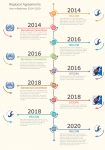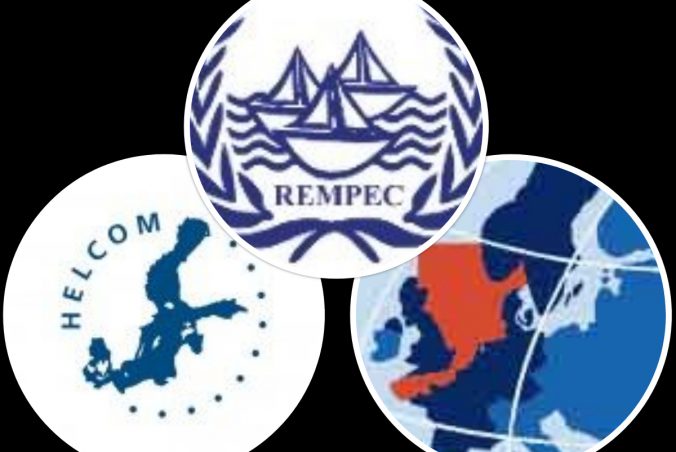Sea Alarm’s first 20 years: Building political infrastructure for oiled wildlife response at the regional level
Sea Alarm has played an active role in motivating European Coastal States to explore the issue of Oiled Wildlife Response and Preparedness via the three major Regional Agreements: “Bonn”, “HELCOM” and “Barcelona”. This article provides an overview of these efforts, and what has been achieved over the years.
What are the regional agreements?
In the field of oil pollution prevention and response there are many regional, multilateral and bilateral agreements in Europe under which neighbouring countries locally or regionally cooperate. But there are three major agreements which are the most influential in the initiation and development of international policies: the Bonn Agreement, Helsinki Convention (HELCOM RESPONSE Working Group) and the Barcelona Convention (pollution response cooperation coordinated via REMPEC).
Under each of these agreements the lead national authorities of coastal countries exchange information, explore and develop technical solutions, cooperate to improve the effectiveness of oil spill prevention and response and have mechanisms in place by which they can request and provide each other mutual assistance where needed. In this regard, the regional agreements are closely related to the international Oil Pollution Response Convention (OPRC), created at the global level, following major oil spills in the past, to provide for mutual assistance between countries.
The European Commission is party to all three European Conventions, and supports the Contracting Parties by ensuring all Member States and neighbouring countries can receive maximum benefit from progress made, coordinating between the different Regional Agreements, making available funding streams for marine pollution preparedness and response projects and lastly (via EMSA) providing equipment and response capacity.
Making a first appearance
In Sea Alarm’s early days, two major oil spills, Erika (1999) and Prestige (2002), greatly increased the awareness of risk within the Regional Agreements, due to the scale of these incidents, the complexity of pollution combat in open sea and the enormous costs of clean-up operations, for which existing insurance systems were falling short. Sea Alarm’s own experiences with the wildlife response during Prestige and Tricor (2003), and also its awareness of the enormous challenges with oiled birds experienced during Erika, were reason to make an introduction at the Regional Agreements.
Invited by the Netherlands delegation to report on the recent wildlife response experiences during the Prestige and Tricolor, Sea Alarm first attended an OTSOPA (Bonn Agreement) working group meeting in May 2003. Its message was: oiled wildlife response should be prepared for, led by authorities and well-integrated into existing national oil pollution plans. Although this message was taken seriously, countries felt that responding to oiled wildlife was outside of their remit, and that this was (and should be) taken care of by NGOs. Also, some countries stated that euthanising oiled animals was the only reasonable solution.
Sea Alarm’s mission
Addressing the Bonn Agreement was the start of Sea Alarm’s advocacy mission. That mission has been continually focussed on increasing serious attention from coastal countries on the challenges of oiled wildlife response, the importance of integrating that preparedness and the vulnerable position of NGOs (often called “volunteers”) being left to deal with wildlife aspects with no structural support from authorities.
Since 2003, Sea Alarm has worked to build its case through “leading by example”: carrying out developmental projects (some with EU funding), responding to incidents, working with NGOs to share experiences and create international response capabilities, engaging with pro-active countries, and committing to progressing activities under the Regional Agreements. Sea Alarm has attended as many meetings of the Regional Agreements as possible, to report on progress made via its activities and to constantly reiterate the importance of authorities getting on board.

Bonn Agreement
The Bonn Agreement is the oldest Regional Agreement on pollution prevention, preparedness and response. It has initiated and led many innovative projects and programmes, leading to a real reduction in chronic and incidental pollution in the North East Atlantic. However it follows a conservative approach, in that NGOs are not able to routinely make expert contributions to its work. Sea Alarm’s attendance at Bonn Agreement meetings are arranged on an ad-hoc basis, by invitation from a supportive country delegation. Achievements include the inclusion of Chapter 34 (wildlife response) in Bonn’s Counter Pollution Manual, which Sea Alarm assisted the Bonn Agreement Secretariat in developing.
The Contracting Parties have also adopted the Self-Assessment Tool (see details under HELCOM Response below) for informing each other of their current state of wildlife preparedness. Another promising development is the formulation of item C3 in the recent Bonn Agreement Strategic Action Plan, which reads:
Strengthen the development of joint approaches to wildlife response, including identification of best practice and communication of wildlife response work to the public.
Sea Alarm will continue assisting and inspiring the Bonn Agreement in looking seriously at integrating wildlife response and expert NGOs in national and international systems of preparedness, hopefully gaining Observer status in the future.
HELCOM Response
Sea Alarm made its first appearance in HELCOM Response in 2007, shortly after completing its participation in three EU projects. One project delivered the rationale for integrated oiled wildlife response planning, the second united European NGOs around a joint cooperative approach to assisting an oiled wildlife response, while the third developed an impact assessment tool for dealing with the effects of spills on seabird populations.
HELCOM Response seriously considered studied the results of these projects and welcomed Sea Alarm’s offer to assist with follow-up activities. In the same meeting HELCOM Response also began work on shoreline response, marking the start of a very fruitful phase of development during which HELCOM Response increasingly looked at the need to integrate wildlife response and shoreline response into its traditional work under the convention on prevention, preparedness and response at sea.
Sea Alarm warmheartedly committed to assisting with this work and requested Observer status, which was granted in 2009. With Estonia as a lead country, and jointly with WWF, Sea Alarm assisted in drafting the Recommendation 31E/6 on Integrated Wildlife Response Planning, which was adopted in 2010. During that same period, a chapter on wildlife response was drafted and included in HELCOM’s Counter Pollution Manual. These milestones went hand in hand with the adoption of the fixed agenda item “shoreline and wildlife response”, which has appeared in every HELCOM Response meeting since.
In 2014, a dedicated Expert Working Group on Oiled Wildlife Response (EWG-OWR), of which Sea Alarm became the chair, was established. Recently this group held its 15th meeting. The group uses Sea Alarm’s Self-Assessment Tool to report on the status of planning and preparedness in the Baltic region. Sea Alarm also participates in the Shore Group, developed to enhance cooperation between the countries’ shoreline response. HELCOM Response continues to be the most advanced and forward thinking of the European Regional Agreements regarding oiled wildlife preparedness and response.
Barcelona Convention
Under the Barcelona Convention for the Protection of the Marine Environment and the Coastal Region of the Mediterranean, a Protocol has been agreed for Contracting Parties to cooperate on the prevention and response to pollution from ships and other emergency situations. The cooperation is coordinated and facilitated by REMPEC, the regional action centre created for this purpose.
In 2011 REMPEC invited Sea Alarm to join the Mediterranean Assistance Unit, composed of a number of expert organisations which can provide support to the Contracting Parties in cases of emergency response, or as part of preparedness activities. REMPEC and Sea Alarm signed an MoU to that purpose, and the MoU has recently been renewed for the fourth time. In their fruitful relationship, the organisations have worked together on projects such as POSOW, through which a Manual for Oiled Wildlife Response and a training course for volunteers were developed.
The organisations support each other’s activities where they can. Sea Alarm is invited to the meetings of Focal Points, held every second year, and, as part of the current WestMOPoCo project, Sea Alarm’s Self-Assessment Tool has been adopted to assess the level of wildlife response preparedness in Mediterranean countries.
The Future
Sea Alarm will continue its dedication to the purposes of the Regional Agreements and its commitment to assist in the development of useful tools and mechanisms that make oil spill response more effective and countries better prepared. The integrated management of pollution response is important for the protection of habitats and marine wildlife, especially when dealing with animal welfare issues where animals are affected. All Regional Agreement countries can continue to improve on that target.
Sea Alarm will continue to be a strong advocate of the professional contribution that NGOs can make to national preparedness and response activities, and the need of formalised authority-NGO cooperation to this end. Sea Alarm also remains committed to the formation of international networks such as EUROWA (where NGOs engage themselves to provide international assistance services), an important part of effective oiled wildlife response.







